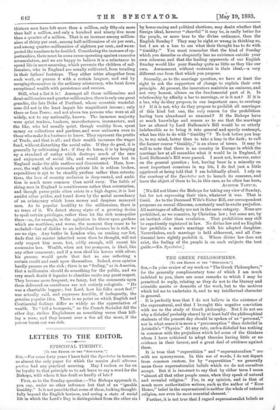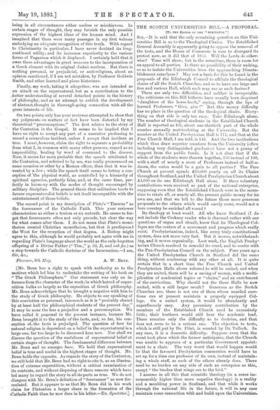THE GREEK PHILOSOPHERS.
[To THE EDITOR OF THE " SPECTATOR-"1 SIR,—In yOur review of my work on "The Greek Philosophers,"- for the generally complimentary tone of which I am much indebted to you, there are some remarks to which I may be permitted to reply, relating as they do not to the literary and scientific merits or demerits of the work, but to the motives which led me to undertake it, and to my intellectual character- in general.
• It is perfectly true that I do not believe in the existence of the supernatural, and that I brought this negative conviction with me to the study of Greek philosophy. But I do not see why a disbelief probably shared by at least half the philosophical students of the present day should be spoken of us "personal, nor in what sense it is more a "preconception " than disbelief in Aristotle's "Physics." At any rate, such a disbelief has nothing in common with the prejudices which led some of the thinkers whom I have criticised• to adopt theories having little or no- evidence in their favour, and a great deal of• evidence against them.
It is true that " superstition " and " supernaturalism " are• with me synonymous. In this use of words, I do not depart from common custom, for by " superstition " we generally mean thoie supernaturalist beliefs which we do not ourselves accept. But it is incorrect to say that by either term I mean " almost all that other people mean, when they speak of natural and revealed religion." For, in my opinion, and in that of much more authoritative writers, such as the author of "Ecce Homo," belief in the supernatural is neither the whole of natural religion, nor even its most essential element. '
Further, it is not true that I regard supernaturalist beliefs as being in all circumstances either useless or mischievous. In certain stages of thought, they may furnish the only possible expression of the highest ideas of the human mind. And I imagined that there were many passages in my first volume embodying an adequate recognition of this truth. With regard to Christianity in particular, I have never doubted its long continued utility, and its immense superiority to the various forms of Paganism which it displaced. I certainly held that it owes these advantages in great measure to the incorporation of a Greek element with its original Judaic nucleus. But there is nothing personal, or prejudicial, or anti-religious, about an -opinion sanctioned, if I am not mistaken, by Professor Goldwin Smith, and other learned and pious historians.
Finally, my work, taking it altogether, was not intended as All attack on the supernatural, but as a contribution to the (better understanding of several detached points in the history of philosophy, and as an attempt to exhibit the development of abstract.thought in thorough-going connection with all the great interests of life.
On two points only has your reviewer attempted to show that my judgments on matters of fact have been distorted by my' theoretical " preconceptions." The first relates to the story of the Centurion in the Gospel. It seems to be implied that I have no right to accept any part of a narrative professing to record a miraculous incident, unless I accept that incident as true. I must, however, claim the right to separate a probability from what I, in common with many other persons, regard as an impossibility, healing by word of command to the disease. Now, it seems Tar more probable that the speech attributed to the Centurion, and referred to by me, was really pronounced on some occasion or other by a Roman officer, than that it was in- -vented, by a Jew ; while the speech itself seems to betray a con- ception of The physical world, as controlled by a hierarchy of spiritual agencies, perfectly false, and, at the same time, per- fectly in harmony with the modes of thought encouraged by military discipline. The general thesis that militarism tends to favour supernaturalist beliefs is not itself incompatible with the entertainment of those beliefs.
The second point is my description of Plato's " Tirnmus" as the forerunner of the Catholic Faith. This your reviewer -characterises as either a truism or an untruth. He seems to for- get that forerunners often not only precede, but clear the way fox what comes after them. I do not mean that Plato's mono- theism created Christian monotheism, but that it predisposed the West for the reception of that dogma. A Bishop might agree to this, although he would probably not agree with me in regarding Plato's language about the world as the only-begotten offspring of a Divine Father (" Tim.," p. 50, D, and sub PO as - a step tewards the Catholic doctrine of the Incarnation.—I am, -Sir, &c., Florence, 8th May. A. W. BENN.
[Mr. Benn has a right to speak with authority as to the motives which led him to undertake the writing of his book on
• " The Greek Philosophers." Our statement was only an in- ference from the character of the work;in which hatred of super- stition bulks as largely as the exposition of Greek philosophy. Mr. Benn acknowledges that he brought a negative with him to the study of Greek philosophy. He objects to our speaking of this conviction as personal, inasmuch as it is " probably shared by at least half the philosophical students of the present day." It may be none the less a prejudice and a preconception. We have called it personal in the present instance, because Mr. Benn brought it to the study of the facts, and, so far, his con- -ception of. the facts is prejudged. The question of how far natural-religion is dependent on a belief in the supernatural is a large one, far too large to be discussed here now. Nor shall we discuss the question of the usefulness of supernatural belief at -certain stages of thought. The fundamental difference between Mr. Benn and us emerges -here. We hold that supernatural belief is true and useful in the highest stages of thought. Mr. Benn holds the opposite. As regards the story of the Centurion, we still hold that Mr. Benn had no right to cite it, as an illustra- tion of extreme superstition, without a critical examination of -its contents, and without disposing of those reasons which have led many to regard the story in all its parts as true. We do not
• disagree with Mr. Benn's definition of "forerunner" as now for- mulated. But it appears to us that Mr. Benn did in his work -claim for Platonism a larger share in the formation of the %Catholic Faith than:he now does in his letter.—En. Spectator.]



































 Previous page
Previous page